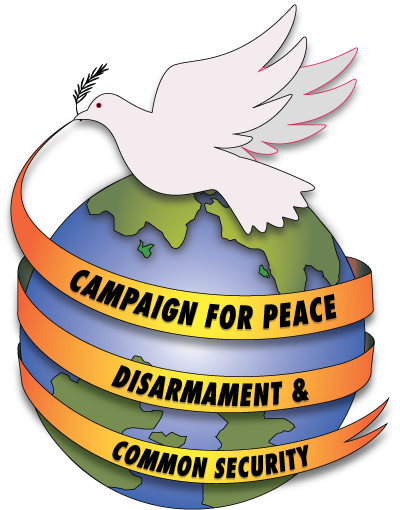The basic idea behind Common Security is that the security of one is inextricably linked to the security of all; that the security of a state, nation, or peoples cannot be achieved at the expense of the security of another; that security is not a zero-sum game.
The term Common Security was coined during the height of 1980s Cold War tensions between the East and West Blocs. Both conventional and nuclear arms races were underway, including the stationing of intermediate range nuclear missiles across Europe. The presence of these nuclear weapons did not make Europeans feel safer, but rather less safe. It made it much more likely that the missiles would be used – whether purposeful or accidental – and this pressure was felt on both sides of the Iron Curtain.
Likewise with the conventional arms race – both the East and West hoped to achieve military superiority over their adversary and therefore achieve ‘security’ – but this only fuelled further arms spending by their adversaries, increasing the deadly capacities of both sides and resulting in a net loss of security by all. At the same time, the arms race deprived Europeans of money badly needed for social wellbeing.
The Palme Commission, which recognized this trend, argued that security is not a zero-sum game; that security can be built through trust-building, cooperation, and disarmament. The 1987 Intermediate Range Nuclear Forces, or INF Treaty, demonstrated in practice that the elimination of intermediate range missiles increased the security of both the East and West blocs.
In the 21st century, we are facing a very different geopolitical reality to that of the 20th century Cold War competition.
The importance of Common Security has been completely forgotten by political leaders, who are increasingly pursuing their own geopolitical and economic interests abroad to the detriment of common security. This selfish pursuance of interests under the guise of national security has not only led to an increase in wars and violent conflict, it has fuelled the polycrisis we face today – from vast economic and social inequalities in and between our societies to the breakdown of the climate and environment and an erosion of true democratic governance.
For example, if we look at the climate crisis and environmental degradation – it is evident that the consequences cannot be contained within or kept out of any national borders; these threats are by nature global and require international cooperation to address. Likewise with global inequalities – the repercussions of unjust economic practices are transnational and across borders.
And of course, geopolitically speaking, we no longer have two large military blocs in competition. Instead, we have the hegemonic ‘West’, led by the NATO bloc, which comprises over half of all global military spending. At the same time, there is a shift already underway away from the post-cold war order and towards a multipolar world in which military power, economic force, and influence are challenged by other regional powers. The result has been an increased reliance on military means, including nuclear weapons, to benefit from this shift.
We now find ourselves in a new arms race, with drastic rises in military spending year after year. This includes increases in nuclear weapons ‘modernization’ programs underway and an extension of nuclear sharing. Nearly all treaties limiting nuclear weapons, based in common security, are no longer in effect, with only the New START agreement between the US and Russia still in place, and set to expire in February next year.
While total military expenditure in 2024 is estimated by the Stockholm International Peace Research Institute as 2.72 Trillion US Dollars, we already know that there will be another unprecedented rise for this year, including the NATO commitment to spend 5% of GDP on the military by 2035 and the European Readiness 2030 plan for increased spending.
Simultaneous to this militarization is an increased reliance on militaries to solve all problems, and an undervaluing, if not complete ignorance of diplomatic and peaceful conflict resolution, leading to a legitimacy crisis for international law and bodies like the United Nations, the International Criminal Court and the International Court of Justice.
Nowhere is this clearer than in Gaza where the ongoing genocide of the Palestinians continues despite global efforts for a ceasefire and end to the occupation. The impunity with which Israel has carried out its genocidal campaign cannot and will not bring about justice or security in the region.
Of course, this is not limited to West Asia – from the Russian invasion of Ukraine to the civil war in Sudan, from the AFC/M23 Occupation of Eastern DRC to the growing military tensions in the South China/West Philippines Sea and the Korean Peninsula, the faulty logic of militarism and deterrence reign supreme and the world moves closer to the brink.
Common Security also understands the interconnectedness of our issues – increased military spending this year has already led to announcements by the UK and EU among others that spending on foreign aid will fall – directly impacting communities in the Global South and fueling insecurities.
Increased military spending will lead to increased CO2 production – in the production, maintenance, and use of military equipment and personnel. A 2025 report from the Transnational Institute, Tipping Point North South, and Stop Wapenhandel, estimates additional CO2 equivalent from the NATO target would be roughly equal to the combined annual emissions of Brazil and Japan by 2030.
Military spending increases in Europe are also expected to skirt workers’ rights standards in Europe, justified by the supposed urgency of new arms and equipment.
And then there is of course the opportunity cost – that military spending must come from somewhere. Time and time again social benefits and welfare are the first to go.
So, in this context, common security provides us an alternative to the status quo of militarization, warfare, climate collapse, and growing inequalities, opting instead for dialogue, diplomacy, and disarmament based in the understanding that we can only overcome these crises together. These tools build trust between governments and peoples and form a basis for further cooperation and peaceful resolution of disputes. They address root causes of conflicts and instability, rather than exacerbating them.
To make common security an effective alternative, the concept must make traction both among global civil society and among our leadership. Pressure from below can push our leaders to take a different approach – to recognize that the path we are on is threatening all that makes us truly secure – a basis of human security, freedom from fear and freedom from want. Good quality jobs, social safety nets, a healthy environment, and peaceful conflict resolution.
Moving to concrete suggestions, firstly we need to establish dialogue between governments as the basis for relations, not threats of physical or economic violence. Secondly, we need to renew disarmament architecture – including the universal ratification of the Treaty on the Prohibition of Nuclear Weapons, but also on new weapons technologies such as artificial intelligence and autonomous weapons systems, weaponized drones, the weaponization of outerspace, and hypersonic missiles – with robust verifications mechanisms. We need mutual reductions in conventional arms that can lead to a net gain in security of all peoples, we need diplomatic thinking that doesn’t view every negotiation as a zero-sum game, but rather actions that can increase the security of all. We need to strengthen international institutions and the role of international law. We need people-to-people exchanges and cultural exchange.
Of course, common security itself will not resolve all the problems we face – but it is an essential shift in our thinking that can facilitate the next steps and avoid the worst consequences of the status quo.
Disarm:
RLS 10% campaign
Special Session on Disarmament UN
Dialogue/negotiations – some may take first step
US milex highest BY FAR

